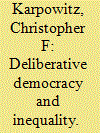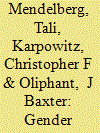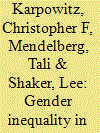|
|
|
Sort Order |
|
|
|
Items / Page
|
|
|
|
|
|
|
| Srl | Item |
| 1 |
ID:
092870


|
|
|
|
|
| Publication |
2009.
|
| Summary/Abstract |
Deliberative democracy grounds its legitimacy largely in the ability of speakers to participate on equal terms. Yet theorists and practitioners have struggled with how to establish deliberative equality in the face of stark differences of power in liberal democracies. Designers of innovative civic forums for deliberation often aim to neutralize inequities among participants through proportional inclusion of disempowered speakers and discourses. In contrast, others argue that democratic equality is best achieved when disempowered groups deliberate in their own enclaves (interest groups, parties, and movements) before entering the broader public sphere. Borrowing from each perspective, the authors argue that there are strong reasons to incorporate enclave deliberation among the disempowered within civic forums. They support this claim by presenting case study evidence showing that participants in such forums can gain some of the same benefits of deliberation found in more heterogeneous groups (e.g., political knowledge, efficacy and trust), can consider a diversity of viewpoints rather than falling into groupthink and polarization, and can persuade external stakeholders of the legitimacy of the group's deliberations.
|
|
|
|
|
|
|
|
|
|
|
|
|
|
|
|
| 2 |
ID:
131520


|
|
|
|
|
| Publication |
2014.
|
| Summary/Abstract |
When and why do women gain from increased descriptive representation in deliberating bodies? Using a large randomized experiment, and linking individual-level speech with assessments of speaker authority, we find that decision rules interact with the number of women in the group to shape the conversation dynamics and deliberative authority, an important form of influence. With majority rule and few women, women experience a negative balance of interruptions when speaking, and these women then lose influence in their own eyes and in others'. But when the group is assigned to unanimous rule, or when women are many, women experience a positive balance of interruptions, mitigating the deleterious effect of small numbers. Men do not experience this pattern. We draw implications for a type of representation that we call authoritative representation, and for democratic deliberation.
|
|
|
|
|
|
|
|
|
|
|
|
|
|
|
|
| 3 |
ID:
121129


|
|
|
|
|
| Publication |
2012.
|
| Summary/Abstract |
Can men and women have equal levels of voice and authority in deliberation or does deliberation exacerbate gender inequality? Does increasing women's descriptive representation in deliberation increase their voice and authority? We answer these questions and move beyond the debate by hypothesizing that the group's gender composition interacts with its decision rule to exacerbate or erase the inequalities. We test this hypothesis and various alternatives, using experimental data with many groups and links between individuals' attitudes and speech. We find a substantial gender gap in voice and authority, but as hypothesized, it disappears under unanimous rule and few women, or under majority rule and many women. Deliberative design can avoid inequality by fitting institutional procedure to the social context of the situation.
|
|
|
|
|
|
|
|
|
|
|
|
|
|
|
|
| 4 |
ID:
105421


|
|
|
|
|
| Publication |
2011.
|
| Summary/Abstract |
By winning the presidency and strengthening its majority in both chambers of Congress, the 2008 election gave control of the government to the Democratic Party. However, as the 2010 election season unfolded, the news for the Democratic Party could not have been much worse. Economic conditions had not improved dramatically. A bitter and lengthy fight over health care reform signaled to citizens that little had changed in how Washington, DC, governed. The stimulus package and its impact on the federal debt caused unease in a segment of the electorate that was concerned with the size of government. In this context, observers of American politics began to take note of the number of citizens affiliating with, or at least expressing favorability toward, a loose coalition of groups known as the Tea Party movement. Tea Party rallies began to occur throughout the United States, seeking to draw attention to the movement's primary issues.
|
|
|
|
|
|
|
|
|
|
|
|
|
|
|
|
|
|
|
|
|